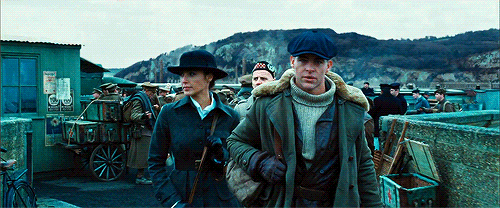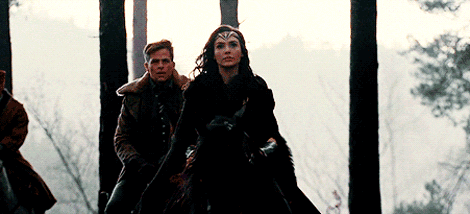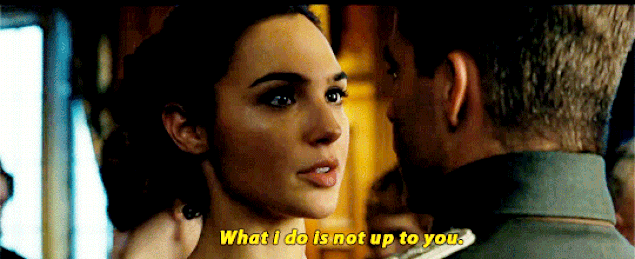The Steve Trevor Factor: Wonder Woman Gives Us a Template for What Gender Equality Can Look Like


It’s interesting to me how, generally, when women are love interests in films, they’re often thinly-drawn characters of very little substance, there to further the male protagonist’s story, but not much else. Yet when the tables are turned, and you have a story with a female protagonist being crafted by a woman, the male love interest is treated with equal respect and given nuance and substance. You know, how all filmmakers should attempt to portray all their lead characters. **SPOILERS IF YOU HAVEN’T SEEN THE FILM**
Without question, this film belongs to Gal Gadot’s Wonder Woman, and she (thanks to Patty Jenkins’ artful direction) delivered a nuanced portrayal of a powerful woman who is inexperienced with the ways of mortals. Yes, she can claw her way up walls with her bare hands, but her heart also breaks for how much suffering human beings seem to allow. She can leap high and far, almost like flying, but when she is told that it’s not a god that’s responsible for humanity being warlike, but that human beings are capable of it themselves, she visibly crumbles, not wanting to believe that the people she believes in so much are capable of such atrocity.
This film, in large part, is about Diana reconciling that. People are gonna do what people are gonna do. So, do they deserve her help or not? And it takes a relationship with one outstanding human example for her to realize that “it’s not about ‘deserve,’ it’s about what you believe.” And Wonder Woman believes in love.
As female-led as this film was, and as important as the variations on femininity it portrayed were to it, the thing that firmly locked Wonder Woman‘s themes of love and feminism in place was its portrayal of Steve Trevor (played beautifully by Chris Pine), and he did so in an important way: by showing us an amazing example of how men and women can interact in an actual, equal partnership.

Steve Trevor seems to be a sore spot for a lot of people precisely because he is (in part) a love interest, and feminists (myself included) tend to get a bit wary of female characters in heterosexual love stories, because the relationships are often handled poorly and end up with the female half of the pairing doing something ill-advised or something that in some way lessens her agency, because love. As if that relationship matters more than, you know, her self respect, or dreams, or anything else going on in her life. I get that. So let’s get the romance aspect out of the way first.
First of all, in this film we don’t even get an inkling of romance between them until after they’ve saved a French village together and dance in the snow. That’s impressive. Usually, a romance is hinted at within the first couple minutes of a couple meeting. Yet, in this film, we get to see a friendship based on mutual respect form first, long before romance is even on the table.
When Diana first saves Steve and they’re on the beach, Diana’s reaction to him isn’t one of attraction, but of fascination. She’s literally never seen a male person before. Meanwhile, Steve doesn’t (as he has in other portrayals) immediately gawp at how pretty she is. When she exclaims, “You’re a man!” His response is, “Yeah. Do I not look like one?” It’s a funny moment that totally speaks to his own insecurities, but what it doesn’t do is read like him being disappointed that she thinks he’s “less than a man” because he wants her. It’s a more general insecurity that’s a product of patriarchal programming (say that three times fast!).
When Diana walks in on him getting out of the pool naked, she’s absolutely unfazed, more interested in his watch than in his anatomy, and only gets uncomfortable because he’s so clearly uncomfortable. Again, we hear the insecurity about his “maleness,” but it has more to do with his own self-image than it has to do with impressing her. Whenever this version of Steve Trevor asserts his masculinity, it’s as if he’s trying to convince himself, and it has very little to do with Diana. These are moments of vulnerability that are only possible for him in such strange place, far away from the social and cultural mores that usually guide him.
And when they finally have their first romantic moment (and in this nearly 2 1/2 hour film, there are only two romantic moments between them), it isn’t gross or forced. Diana, who’s read about sex (and who doesn’t need men for pleasure, thank you very much), but has likely never had any (despite her being canonically bisexual in the comics, in this version of her story, she grew up as the only child with her mother and her mother’s older friends. I don’t know about you, but I likely wouldn’t be doing much hooking up, if any, if I were limited to an island of my mom and my mom’s friends), is really experiencing romantic feelings for the first time, and Gadot’s performance really captures that in a beautiful way.
She is equally turned on and fascinated by her own feelings as she and Steve have their moment in the snow. Later, when he goes to her room, she’s waiting there, expectant and unafraid. He gauges her response before approaching. It’s all very respectful and sweet, and you never get the sense that this is anything other than what Diana wants right now.
And we don’t see what happens between them other than a kiss. The implication is that they have sex, but we don’t know for sure. Even better? After that happens, Diana isn’t wandering around making goo-goo eyes at Steve the rest of the movie. Her feelings for him don’t cloud her judgment or distract her from her mission. They don’t even have the expected “awkward morning-after talk” that most other films would foist upon its characters. They just go on about their business, because they have shit to do.
In the end, it’s Steve who professes his love for her. Meanwhile, her feelings for him are much more complicated. Does she love him romantically? Quite possibly. But she also loves him as an example of what an amazing human being can be, and I think that’s more important to her. Diana’s feelings for Steve Trevor are deep. They aren’t Hallmark Card love feelings. He inspires her.

When Steve meets the Amazons, he recognizes them instantly as a formidable force (and a lasso of truth is the absolute worst thing for a spy to encounter), and when they have to battle the Germans who’ve managed to make their way to Themyscira, he wants to help (because he’s basically to blame for them being there in the first place), but he fights with them as a member of the team, finding a place among them, not dictating what they should be doing. Later, when they’re in the midst of battle in the village they save, Steve remembers a move he saw the Amazons do that he knows Diana would remember. He shouts “Shield!” and knows that Diana will jump on the car door they found to jump up to where the enemy is.
He not only remembers the Amazons’ battle tactics, but knows to use them. He respects what they’ve taught Diana, and he trusts that Diana will pick up what he’s throwing down.
Throughout the film, he genuinely respects Diana, and they work together. He never thinks he’s better than her, even if he’s not always sure she’s doing the right thing. When he stops her from running into danger, it’s always for reasons having to do with tactics (she’s being impatient, her actions now will impede actions they’ll want to take later, etc), never because he doesn’t think she’ll make it, or even because he loves her and doesn’t want to see her hurt. He knows she won’t get hurt. He argues with her as an equal.
He believes in and trusts her, and together they get through some pretty intense stuff. And even though she’s stronger than him, she never tries to take away his agency. She doesn’t want to see him in danger, but she also lets him and the rest of their rag-tag band of misfits handle what he can handle. They were a legitimate TEAM. She had faith that they would come through when she needed them, and they had faith in her.

As the film is, in large part, about Diana growing up and dealing with being disillusioned, it is Steve who provides what “the girlfriend” in most films usually provides: emotional perspective. Clearly, Diana is someone who is in touch with her emotions, but even Amazons get the blues, and when she does, Steve reminds her that “It’s not about ‘deserve.’ It’s about what you believe.” It’s something that Diana already knew deep down, but she needed a reminder, and this person, with whom she has been through so much, and who has been an amazing example of the best that humanity can be, is the perfect person to give her that reminder.
Wonder Woman is an amazing film in large part because it gives us a vision of equality. It’s like See? Men and women CAN work together and protect each other in a way that isn’t sexist! This is what it looks like! This movie is about individuals each having a choice about how to comport themselves and lead their lives, how everyone should always be given that choice, no matter what their gender. Feminist AF.
(images: Warner Bros/DC Entertainment)
Want more stories like this? Become a subscriber and support the site!
—The Mary Sue has a strict comment policy that forbids, but is not limited to, personal insults toward anyone, hate speech, and trolling.—
Have a tip we should know? [email protected]